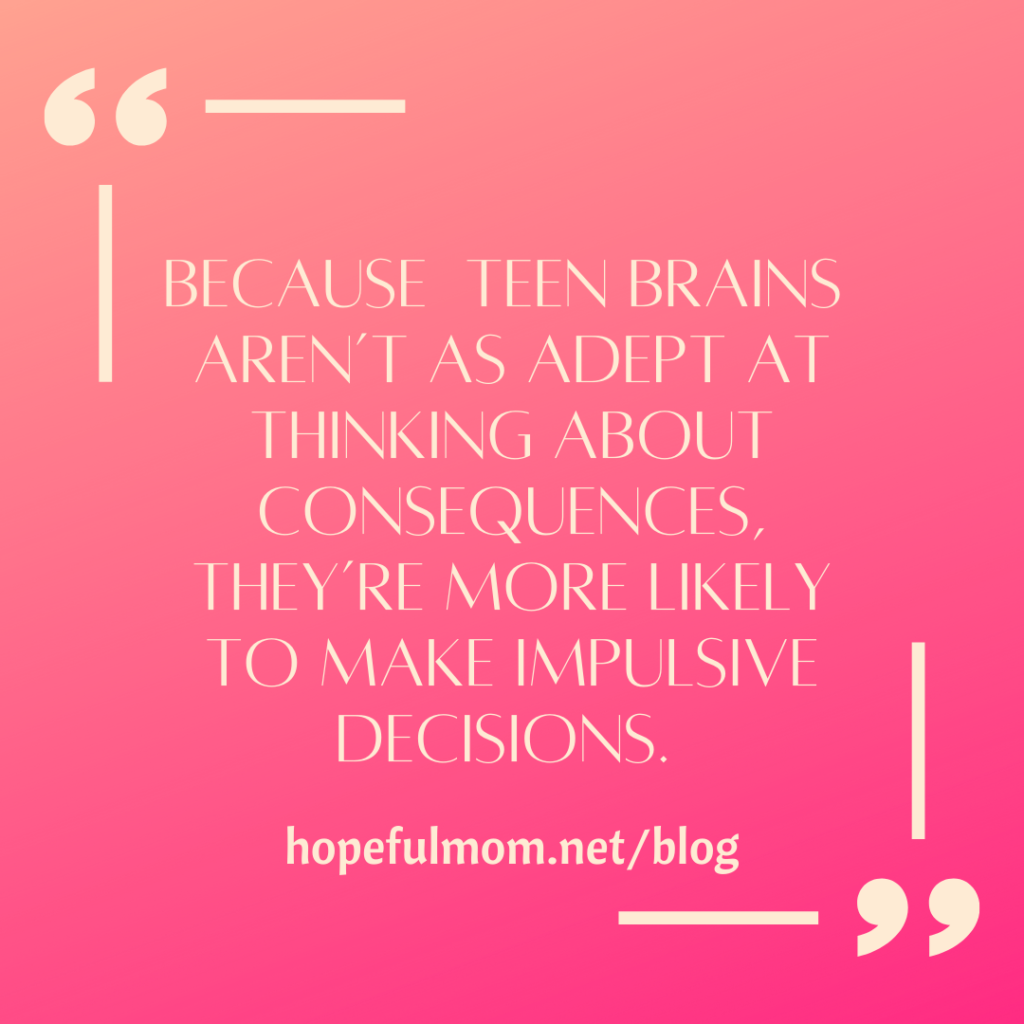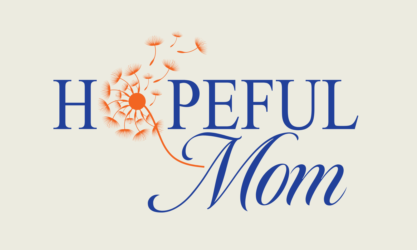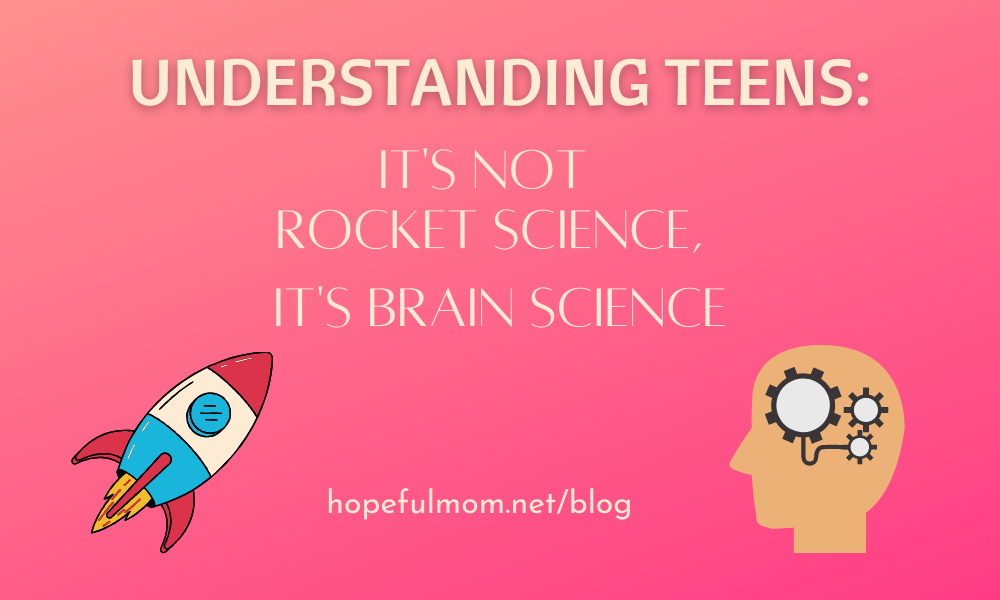Have you ever wondered why your child makes irrational or illogical decisions? No matter how many times you’ve explained the consequences of a negative choice, your words appear to go in one ear and out the other. When a peer suggests they ride bikes in a construction zone, stay up late playing online games, or look at pornographic videos, their sense of reasoning disappears. Part of the answer has to do with brain science.
When my son felt a compulsion to watch pornography (was, in fact, addicted), I didn’t understand the pull. If he comprehended the dangers, why did he go back to it over and over? It was only after I researched the addictive nature of pornography and the brain science behind addictions that I caught a glimpse of his dilemma.
You don’t have to be a rocket scientist to understand brain science.
An individual’s brain is not fully developed until mid-20s. Until then the prefrontal cortex, the logical, reasoning portion of the brain, doesn’t work to full capacity. Rather, someone with an immature brain is more prone to make decisions with their amygdala, the fight-or-flight, gut instinct, emotional portion of the brain.
A University of Rochester Medical Center article explains it this way:
“It doesn’t matter how smart teens are or how well they scored on the SAT or ACT. Good judgment isn’t something they can excel in, at least not yet.
The rational part of a teen’s brain isn’t fully developed and won’t be until age 25 or so.
In fact, recent research has found that adult and teen brains work differently. Adults think with the prefrontal cortex, the brain’s rational part. This is the part of the brain that responds to situations with good judgment and an awareness of long-term consequences. Teens process information with the amygdala. This is the emotional part.
In teens’ brains, the connections between the emotional part of the brain and the decision-making center are still developing—and not always at the same rate. That’s why when teens have overwhelming emotional input, they can’t explain later what they were thinking. They weren’t thinking as much as they were feeling.”
Patterns and Habits
Because our teens aren’t as adept at thinking about consequences (if I do this, then this will happen), they’re more likely to make impulsive decisions. When they see something enticing, they reach for it.

When I’m in the classroom explaining brain science to ninth-graders, I put a piece of chocolate on the table next to me and state, “I’m somewhat of a chocoholic. When I see chocolate, my mouth starts watering, and I automatically grab it. My brain has been programmed, or wired, to pick it up and eat it. It’s instinctual.” My brain craves the dopamine hit it receives when the smell or taste of chocolate hits my senses.
When we make the same choice over and over, our brain forms neural pathways. Our behaviors become automatic. When I first tasted chocolate, I found it pleasurable. The next time I saw a piece of chocolate, I remembered how yummy it was and had another piece, despite the fact I knew there was no health benefits. Yes, there may be some benefits in dark chocolate, but you catch my drift. Years later, the response is automatic. See. Reach. Eat. Dopamine. Pleasure.
Because teen brains are still forming, teens are more prone to developing habits which turn to addictions. As the brain develops, it builds neuropathways, or grooves. The grooves formed in our children’s brain now will follow them into adult years. So it’s more important for preteens, teens, and young adults to make healthy choices, to condition their brains to choose wisely, than it is for adults.
Because teen brains are still forming, teens are more prone to developing habits which turn to addictions. Understanding Teens: It’s Not Rocket Science, It’s Brain Science #brainscience #hopefulmom #teenbrains Share on XThankfully, our brain is neuroplastic. It’s pliable. Those grooves are not permanent.
That means I can change my automatic response to chocolate. I can choose to break the pattern and make a different decision when a piece of chocolate is staring me in the face. And so can our children.
Why is this important? How does this information regarding the brains help us parent our children?
- If you think your preteen or teen made a rash decision, especially while under stress or pressured by peers, you’re probably right. Rather than get angry because they haven’t employed commonsense decision-making skills, remember their prefrontal cortex is still developing, take a deep breath, and speak calmly.
- If you believe your child has a compulsion or addiction to pornography (or screens, gaming, vaping, etc.), don’t expect them to have the skills or ability to walk away easily. The brain has formed those pathways. Their body craves the dopamine hit it’s accustomed to.
- Help them strengthen their prefrontal cortex by teaching them to resist temptation, get plenty of sleep, eat well, and exercise.
- Ask them how you can help them.
The University of Rochester article has these suggestions:
“Discussing the consequences of their actions can help teens link impulsive thinking with facts. This helps the brain make these connections and wires the brain to make this link more often.
Remind your teens that they’re resilient and competent. Because they’re so focused in the moment, teens have trouble seeing that they can play a part in changing bad situations. It can help to remind them of times in the past that they thought would be devastating but turned out for the best.”
Mom, Dad, Grandparent, Caregiver, my hope is this information helps ease your burdens. I blamed myself for my son’s behavior. When I understood this brain science and a teen’s compulsion to irrational and unhealthy choices, I was able to take a different approach toward tackling the issue. And I felt less guilty.
For more information regarding brain science, check out these resources:
Porn, Addiction, and the Brain article by Fight the New Drug
How Does Porn Affect the Brain Dr. John D. Foubert LLC
Winning the War in Your Mind by Craig Groeschel
Thanks for offering me your time. Subscribe below for updates and two FREE PDFs. Connect with me on Facebook and Instagram. Pick up a copy of Sexpectations: Helping the Next Generation Navigate Healthy Relationships. And please share this post.
About the author
Barb Winters is the author of Sexpectations: Helping the Next Generation Navigate Healthy Relationships and founder of Hopeful Mom. She’s a certified mental health coach and offers one-on-one consultations for parents. For more about Barb, click "About" in the menu.




6 Replies to “Understanding Teens: It’s Not Rocket Science, It’s Brain Science”